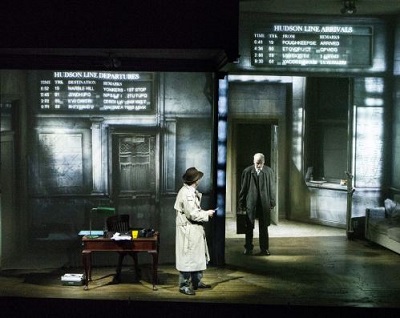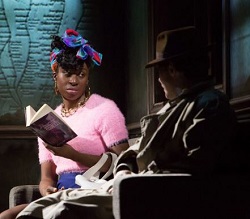Magical Special Effects Can't Save Superficial City of Glass
Lyric's play based on Paul Auster's book falls very short, says Penny Flood
This play is based on a book by Paul Auster, who is acknowledged as one of the greatest living writers in America. I confess to never having read any of his books, and this has done nothing to persuade me that it's something I should put on my bucket list.

The most striking thing about it is the special effects: a brilliant marriage of art and technology, they are fabulous, magical, optical illusions. The basic setting is a room with bare walls, a table and chair and some doors, the animation sets the scenes. Bare walls suddenly become shelves of books; portraits become landscapes; the sun rises and sets; and it pours with rain.
The Tower of Babel appears and morphs into New York City; there's a leafy glade and then, hey presto, we're in Grand Central Station. And much more.
But, magical and fascinating as they are, it's not the job of the special effects to be the main event, that’s what the play is meant to do, and it falls very short.
The story, which is told with a mix of narration and dialogue starts in a film noire sort of way as the narrator says: "It was a wrong number that started it. The telephone ringing in the middles of the night, and the voice on the other end asking for someone he was not."
The phone is answered by Daniel Quinn, a moderately success thriller writer. The voice on the other end is asking for a private detective called Paul Auster, so Daniel decides to pretend that he’s Paul Auster and accepts the case. He’s employed by ayoung man, Paul Stillman to track down his father, also Paul Stillman, who is about to be released from prison. Of course Daniel finds the old man and this is where the story takes a sharp change of direction to become a forum for talk and cod philosophy.
Lots and lots of talk. Walls of words
There are more scenes with more characters just talking. It goes on and on with the New York Mets, Cervantes, Adam & Eve, Christopher Columbus and even Humpty Dumpty getting a look in. However, the main underlying theme is around the issues of reality and identity: at times there are two Daniel Quinns on the stage, the two Stillmans - father and son are played by the same character, the real Paul Auster turns up but is he the private detective who is being impersonated by Daniel or the author of the book? It could have been interesting and thought provoking, but the discussions are very superficial and it becomes tedious.

Surprisingly a cast of just six play all 15 of the characters that pop up during the play. They are Vivienne Acheampong, Mark Edel-Hunt, Chris New, Jack Tarlton, Charlie Cunningham and Oscar Williams. Well done guys!
And finally: there's a virtual reality kiosk in the bar area where you can put on those big goggles and watch a short movie loosely connected to the play. It's great fun. I don't think you need a ticket to have a go, and if you do have a go, watch out for the ash trays.
City of Glass continues at the Lyric Hammersmith until 20 May. Find out more and book tickets here.
May 2, 2017
Related links
|
